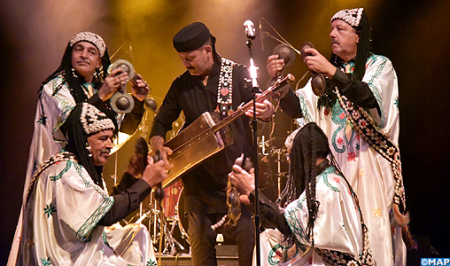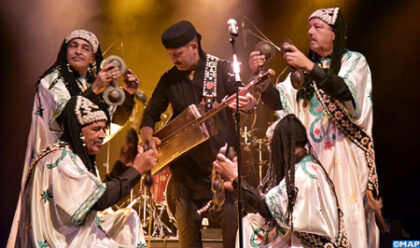
Gnawa Music is Now Part of UNESCO World Cultural List
 Morocco’s popular Gnawa musical events have been included in the prestigious UNESCO list Intangible Cultural Heritage of Humanity. The decision was made by the UN body’s Intergovernmental Committee for the Safeguarding of the Intangible Cultural Heritage at a meeting held in the Colombian capital.
Morocco’s popular Gnawa musical events have been included in the prestigious UNESCO list Intangible Cultural Heritage of Humanity. The decision was made by the UN body’s Intergovernmental Committee for the Safeguarding of the Intangible Cultural Heritage at a meeting held in the Colombian capital.
Gnawa includes a set of musical events, performances, fraternal practices and therapeutic rituals mixing the secular with the sacred. It is a Sufi brotherhood music that combines lyrics with a generally religious content, invoking ancestors and spirits.
Dating back to at least the 16th century, Gnawa culture is considered as part of Morocco’s multifaceted culture and identity. The Gnawa bands, especially in the Atlantic city of Essaouira, practice a therapeutic possession ritual through all-night rhythm and trance ceremonies combining ancestral African practices, Arab-Muslim influences and native Berber cultural performances.
The Gnawa in rural areas organize communal meals offered to marabout saints. Some Gnawa in urban areas use a stringed musical instrument and castanets, while those in rural areas use large drums and castanets. Colourful, embroidered costumes are worn in the city, while white attire with accessories characterize rural practices.
Gnawa music is thus joining seven other elements of Morocco’s cultural heritage in the Representative List of Intangible Cultural Heritage of Humanity, namely the cultural space of Jemaa el-Fna Square, the Moussem of Tan-Tan, the Cherry festival in Sefrou, the Mediterranean diet, practices and know-how concerning the Argan tree, Falconry and Taskiwin, a martial dance of the western High Atlas.
The decision of the Unesco Committee is a tribute to the richness of the cultural heritage and ethnic diversity of the Kingdom
